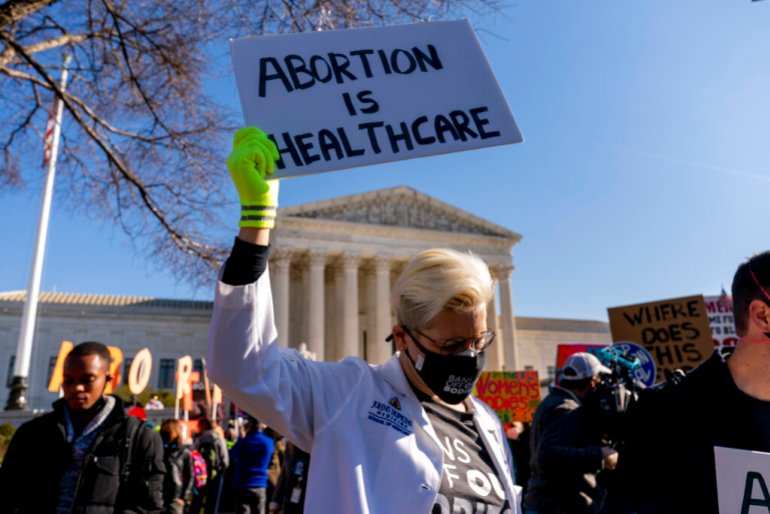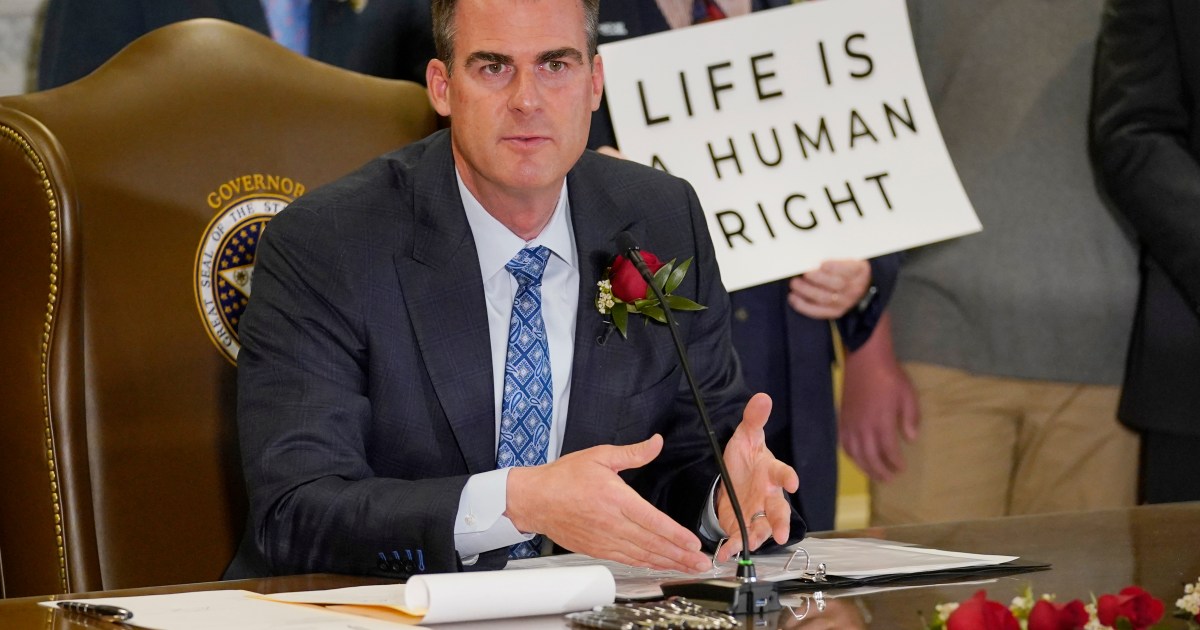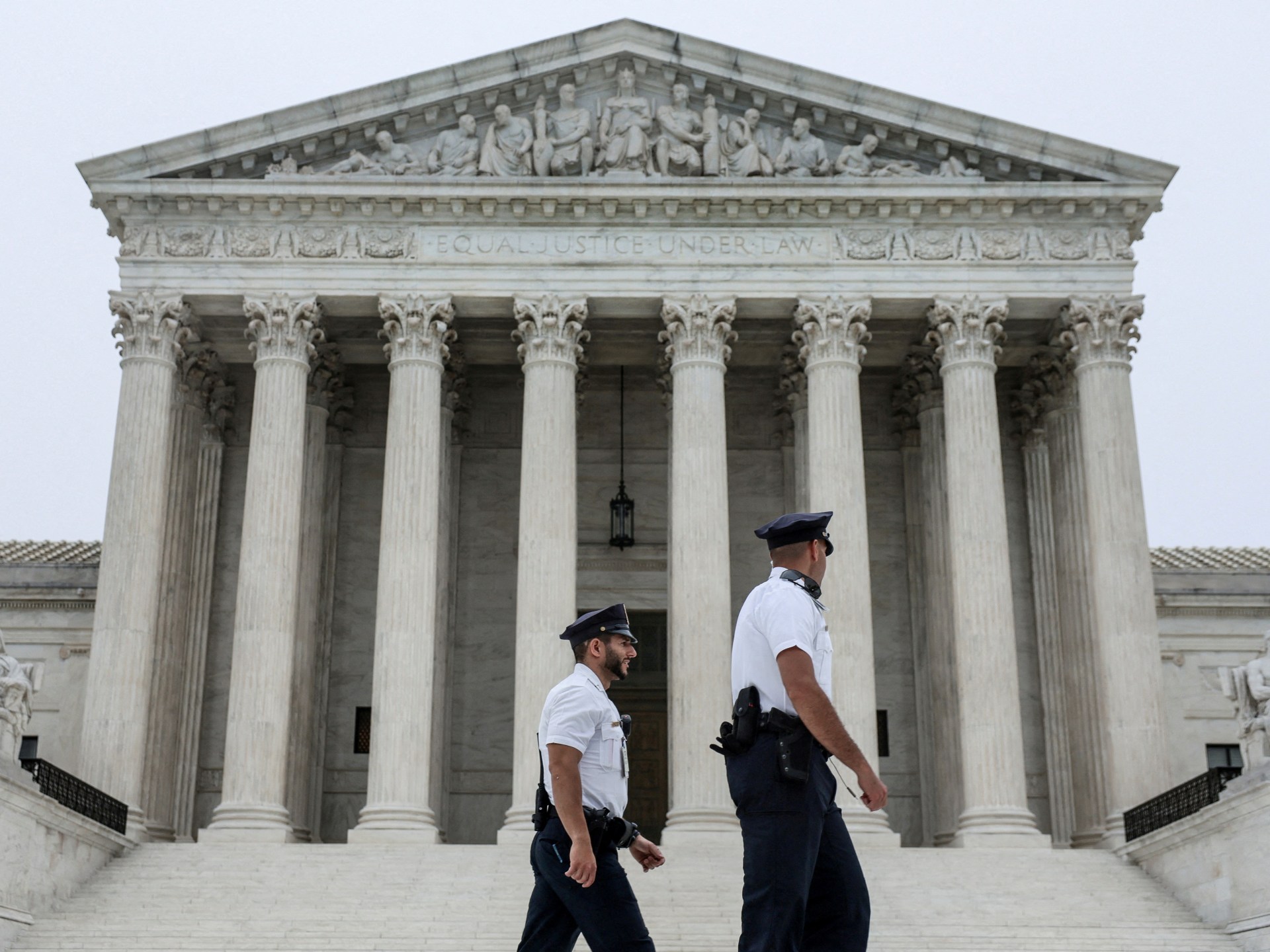US: Oklahoma governor signs near-total abortion ban | Women News
The governor of the US state of Oklahoma has signed into law a bill that makes it illegal to perform abortions except in medical emergencies, as conservative politicians across the United States continue to crack down on abortion rights.
Republican Governor Kevin Stitt on Tuesday signed the legislation, which carries a penalty of up to $100,000 and 10 years in prison for anyone who performs the procedure. It does not authorise criminal charges against a woman for receiving an abortion.
“We want to choose life in Oklahoma. We do not want to allow abortions in the state of Oklahoma,” Stitt said during a news conference.
State Senator Nathan Dahm, a Republican now running for Congress who wrote the bill, called it the “strongest pro-life legislation in the country right now, which effectively eliminates abortion in Oklahoma”.
If it is not blocked by a court, the near-total abortion ban will come into effect later in the year, widening the US area in which access to legal abortion services is curtailed.
The Oklahoma legislation prompted condemnation from women’s rights advocates and other groups, including reproductive rights organisation Planned Parenthood, which condemned it as “cruel and blatantly unconstitutional”.
“If the courts let this ban take effect in August, people across the state will be forced to continue pregnancies against their will. This fight isn’t over,” the American Civil Liberties Union (ACLU) said on Twitter on Tuesday morning.
BREAKING: Oklahoma Governor Stitt just signed a total ban on abortion into law.
If the courts let this ban take effect in August, people across the state will be forced to continue pregnancies against their will.
This fight isn’t over.
— ACLU (@ACLU) April 12, 2022
A battle over access to abortion is raging in the US, where the nation’s highest court is expected to rule by June on a Mississippi case that could see the landmark 1973 Roe v Wade decision overturned.
That ruling set out a woman’s right to have an abortion, and should it be overturned, more than two dozen US states are poised to pass legislation banning abortion, according to an October report by the Guttmacher Institute, a reproductive rights research group.
Last year, Texas passed legislation that bans abortions after six weeks of pregnancy – the point at which many women do not even know they are pregnant – and allows citizens to sue anyone who provides abortion services in violation of that restriction.
Rights advocates denounced the measure as especially harmful to Black and other women of mixed races, as well as low-income women. They also warned that it could lead to similar laws being passed in other Republican-led states.
Since the Texas law, known as SB8, came into effect, women have had to travel to neighbouring states to get abortions, including Oklahoma.

According to researchers at the Texas Policy Evaluation Project at The University of Texas at Austin (PDF), 45 percent of Texans who travelled out of the state between September and December of last year received abortion services in Oklahoma.
“Oklahoma has just four facilities that provide abortion, and the number of Texans seen each month at these clinics since SB 8 went into effect is more than twice the monthly average of all abortion patients seen in Oklahoma in 2020,” they found.
This week, Lizelle Herrera was arrested in Texas and charged with murder over a self-induced abortion in what reproductive rights advocates said was a “terrifying preview” of what abortion bans across the US could lead to.
After widespread outcry, the local Texas district attorney said on Sunday that the charges against Herrera would be dropped. “In reviewing applicable Texas law, it is clear that Ms. Herrera cannot and should not be prosecuted for the allegation against her,” Gocha Allen Ramirez said in a statement.
Meanwhile, back in Oklahoma, separate legislation introduced in the state this year proposes banning almost all abortions and relying on private citizens to sue any person who “aids or abets” abortions, similar to the six-week abortion ban in Texas.
That bill contains an emergency clause, which would allow it to take effect immediately once it is signed by the governor.
Right now, reproductive rights are under attack in states across our nation. The Oklahoma legislature advanced a shameful bill that would prohibit almost all abortions if put into effect. If signed, this bill will only prevent women from getting the health care they need.
— Vice President Kamala Harris (@VP) April 6, 2022




